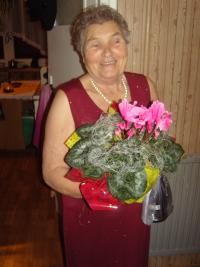I am a woman from the East, from Volhynia, even though I have been living here since 1945.

Download image
EWA SZPIECH Born May 27 1932, Skrychołowy - county Horochów , Vojewodship Volhynia, Eastern Borderlands (Kresy Wschodnie),Volhynia. Maiden name: SALECKA Parent’s names: Józef , Paulina - maiden name - Paszkowska In 1943, the Salecki family was expelled from their homeland in Volhynia by Ukrainian gangsters. They spent two years in Eastern Poland, in the Bieszczady Mountains. After the war they arrived in the „New Lands” (Ziemie Odzyskane), which means the western regions of Poland, and here, they settled in Otmuchów. In 1951 she got married to Stefan Szpiech. They had three children together: Alicja ( March 22, 1952); Barbara (July 18, 1954); Jerzy (January 5, 1958) She graduated from the „Zespól Szkół Zawodowych i Technicznych” in Nysa with a degree as a confectioner. She worked in the Otmuchów confection factory. Ewa Szpiech is a pensioner and lives in Otmuchów.
